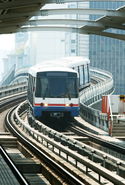The Thai language has its own set of numerals, although the standard Arabic/Western numerals are much more commonly encountered. You may come across the Thai numerals in government and official documents, legal documents, religious texts, page numbers of textbooks or generally anything related to Thai tradition or history. When doing mathematics, Thai students will typically use the Arabic numerals for doing calculations but will write the answer in Thai numerals.
A common use for the Thai numerals that you're likely to see is in double pricing situations, where a price for Thais is written in Thai numerals whereas the more expensive price for foreigners is written in Arabic numerals. If you can learn the Thai numerals, your chances of being able to only pay the Thai price are much improved!
Counting in Thai is relatively straightforward, and by memorising only 17 words you can count into the millions. Due to the frequent need to haggle prices in Thailand, knowing the numbers and being able to count comes in very useful. The numbers 1-10, shown below, form the basis of all the others.
Numbers 1 to 10
|
Arabic Numerals
|
Thai Numerals
|
Pronunciation
|
|
0
|
๐
|
ศูนย์ sŏon |
|
1
|
๑
|
หนึ่ง nèung |
|
2
|
๒
|
สอง sŏng |
|
3
|
๓
|
สาม săam |
|
4
|
๔
|
สี่ sèe |
|
5
|
๕
|
ห้า hâa |
|
6
|
๖
|
หก hòk |
|
7
|
๗
|
เจ็ด jèt |
|
8
|
๘
|
แปด bpàet |
|
9
|
๙
|
เก้า gâo |
|
10
|
๑๐
|
สิบ sìp |
Numbers 11 to 100
Numbers 12 - 19 are the same as 2-9 except with the number ten , สิบ ( sìp ), in front of them. 11 is slightly different, as from 11 onwards whenever หนึ่ง ( nèung , the number 1) is the last word in a number it becomes เอ็ด ( èt ) instead.
|
Arabic Numerals
|
Thai Numerals
|
Pronunciation
|
|
11
|
๑๑
|
สิบเอ็ด sìp èt |
|
12
|
๑๒
|
สิบสอง sìp sŏng |
|
13
|
๑๓
|
สิบสาม sìp săam |
|
14
|
๑๔
|
สิบสี่ sìp sèe |
|
15
|
๑๕
|
สิบห้า sìp hâa |
|
16
|
๑๖
|
สิบหก sìp hòk |
|
17
|
๑๗
|
สิบเจ็ด sìp jèt |
|
18
|
๑๘
|
สิบแปด sìp bpàet |
|
19
|
๑๙
|
สิบเก้า sìp gâo |
Counting in Thai is relatively straightforward, and by memorising only 17 words you can count into the millions. Due to the frequent need to haggle prices in Thailand, knowing the numbers and being able to count comes in very useful. The numbers 1-10 form the basis of all the others.
For the numbers greater than 19, the multiple of ten is placed before the สิบ sìp at the start of the number. For instance, 30 is สามสิบ săam sìp which if translated literally is just "three ten". Numbers in the twenties are an exception though, as 20 is ยี่สิบ yêe sìp not สอง สิบ sŏng sìp.
|
Arabic Numerals
|
Thai Numerals
|
Pronunciation |
|
20
|
๒๐
|
ยี่สิบ yêe sìp |
|
21
|
๒๑
|
ยี่สิบเอ็ด yêe-sìp-èt |
|
22
|
๒๒
|
ยี่สิบสอง yêe-sìp-sŏng |
|
23
|
๒๓
|
ยี่สิบสาม yêe-sìp-săam |
|
30
|
๓๐
|
สามสิบ săam sìp |
|
31
|
๓๑
|
สามสิบเอ็ด săam-sìp-èt |
|
32
|
๓๒
|
สามสิบสอง săam-sìp-sŏng |
|
40
|
๔๐
|
สี่สิบ sèe sìp |
|
50
|
๕๐
|
ห้าสิบ hâa sìp |
|
60
|
๖๐
|
หกสิบ hòk sìp |
|
70
|
๗๐
|
เจ็ดสิบ jèt sìp |
|
80
|
๘๐
|
แปดสิบ bpàet sìp |
|
90
|
๙๐
|
เก้าสิบ gâo sìp |
|
99
|
๙๙
|
เก้าสิบเก้า gâo-sìp-gâo |
Into the millions
Above that, 100 is ร้อย rói and 1000 is พัน pan.
|
Arabic Numerals
|
Thai Numerals
|
Pronunciation |
|
100
|
๑๐๐
|
หนึ่งร้อย nèung rói |
|
200
|
๒๐๐
|
สองร้อย sŏng rói |
|
555
|
๕๕๕
|
ห้าร้อยห้าสิบห้า hâa-rói-hâa-sìp-hâa |
|
1000
|
๑๐๐๐
|
หนึ่งพัน nèung pan |
|
9999
|
๙๙๙๙
|
เก้าพันเก้าร้อยเก้าสิบเก้า gâo-pan-gâo-rói-gâo-sìp-gâo |
Thai differs from English in that it also has separate words for 10,000 (หมื่น , mèun ) and 100,000 (แสน , săen ) . 1,000,000 is ล้าน ( láan ).
|
Arabic Numerals
|
Thai Numerals
|
Pronunciation |
|
10,000
|
๑๐
,๐๐๐
|
หนึ่งหมื่น nèung mèun |
|
123,456
|
๑๒๓
,๔๕๖
|
หนึ่งแสนสองหมื่นสามพันสี่ร้อยห้าสิบหก nèung săen sŏng mèun săam pan sèe rói hâa sìp hòk |
|
1,999,999
|
๑
,๙๙๙
,๙๙๙
|
หนึ่งล้านเก้าแสนเก้าหมื่นเก้าพันเก้าร้อยเก้าสิบเก้า
nèung láan gâo săen gâo mèun gâo pan gâo rói gâo sìp gâo |
In common speech, nèung , the number 1, is frequently dropped when it appears first in a number (except for the number 1 itself, obviously). Similarly, rói , pan , mèun and săen are often dropped when they are the last word in a larger number. For instance, rói can be dropped when it's the last word and the number is greater than 1000 . pan can be dropped when it's the last word and the number is greater than 10,000 etc.
To use the number 1700 as an example: its full pronunciation is nèung pan jèt rói , but in common speech it would often be abbreviated to just pan jèt .







Comments